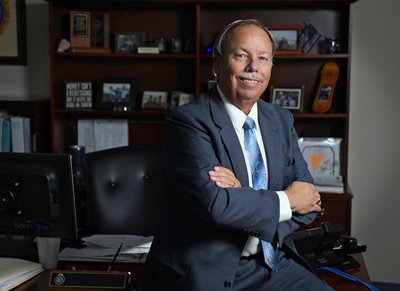 What drew you to a career in policing?
What drew you to a career in policing?
In middle school, we had career day and I went around to all of the booths to see the options. One of the people who was there was a police officer who was really engaging. He talked about how it was a public service, and, yeah, you catch the bad guys. He also said it was a job for people who enjoy being outdoors and getting involved. It sparked my interest.
Then, when I was in college, I did a ride-along with a police agency and said, “Yeah, this is what I want to do.” And here I am.
What attracted you to this job?
With my background in law enforcement, it became a natural segue to go back into the public sector after 14 years with The Dispatch Printing Co. and affiliates in the private sector. Coming back into something like this is truly different from being a front-line police officer and police chief, but it’s back into the heart of supporting education for the 33,000 law enforcement officers we have here in the state.
What are your priorities for OPOTA?
I don’t have specific goals yet because I want to learn as much as I can and meet with staff and our many partners before setting priorities. But my big goal is to continue to maintain and make OPOTA, and all the training we give here, some of the best in the country.
What do you think of the state of police training in Ohio?
It’s good, but it can always be expanded. We need to be proactive in identifying what the future issues in policing will be. Some things that happen today might seem like a little blip, but we need to be able to recognize, “You know what, that could become something in the future that we need to be concerned with.”
It’s important to get input from all the partners around the state, whether it’s county sheriffs, State Highway Patrol, local municipal police officers. We need to get their input so that we know what kind of training they may need into the future also.
What would you tell people considering going into law enforcement?
That, despite all of the bad publicity that happens with officers around the country, this is still one of the most noble professions you could do. Certainly, being a law enforcement officer is about catching bad guys, but it’s mostly about public service. It’s about helping individuals who turn to law enforcement because you represent your community and you’re there 24-7. They trust that they can pick up a phone and a police officer will respond to help them in their most critical times. Public service is truly what you’re providing in law enforcement.
What do you do when you’re not working?
My family loves boating, and we center all of our vacations in the summer. We spend multiple days
every year up at Lake Erie and Cedar Point on the waterfront. And then we take our ski boat to the big lakes down in Kentucky for our annual family vacation. So our vacations are all based around water and boating, and that’s pretty much my hobby.
Bio box
Hometown: Franklin County
Family: married to Peggy for 37 years; three adult children: Amanda, a nurse practitioner in a trauma fellowship at OhioHealth Grant Medical Center; Chad, a BCI special agent in southern Ohio; and Tyler, a mechanical engineer in Kansas City
Education: FBI National Academy (163rd session); Franklin University, graduated summa cum laude with a bachelor’s degree in public administration; Police Executive Leadership College; Ohio State Highway Patrol Basic Police Academy (38th session); Columbus State, associate degree in Law Enforcement Technology
Previous roles: The Dispatch Printing Co., vice president of corporate security, 2006-19; Ohio Department of Public Safety Ohio Investigative Unit, executive director, 2005-06; Upper Arlington Division of Police — chief, 1995-2005; sergeant, 1987-95; detective, 1985-87; patrol officer, 1978-85